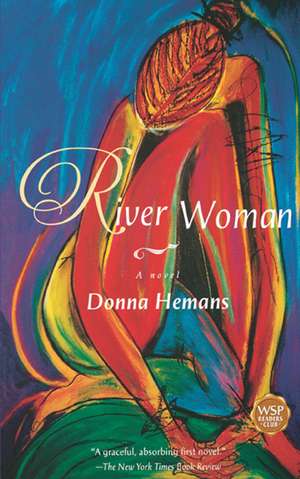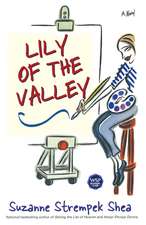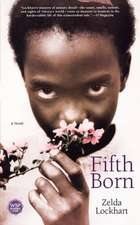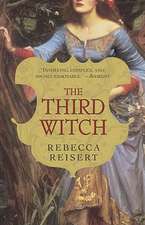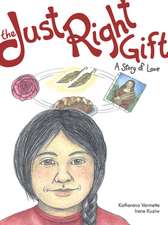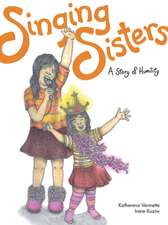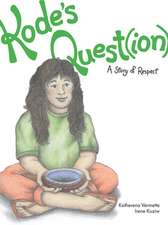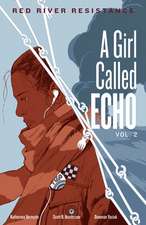River Woman: A Novel
Autor Donna Hemansen Limba Engleză Paperback – 2003
What really happened at the river? It is a question Kelithe's mother cannot ask and an accusation Kelithe will not answer. And it lies at the heart of this shattering novel of promises kept and broken. In spare prose, Donna Hemans lays bare the human heart, exploring the unyielding bonds joining mother and child and the many facets of truth.
| Toate formatele și edițiile | Preț | Express |
|---|---|---|
| Paperback (2) | 100.82 lei 3-5 săpt. | |
| HOUSE OF ANANSI PR LTD – 10 oct 2018 | 100.82 lei 3-5 săpt. | |
| ATRIA – 2003 | 101.45 lei 3-5 săpt. |
Preț: 101.45 lei
Nou
Puncte Express: 152
Preț estimativ în valută:
19.41€ • 20.34$ • 16.05£
19.41€ • 20.34$ • 16.05£
Carte disponibilă
Livrare economică 21 martie-04 aprilie
Preluare comenzi: 021 569.72.76
Specificații
ISBN-13: 9780743410403
ISBN-10: 0743410408
Pagini: 256
Dimensiuni: 127 x 203 x 18 mm
Greutate: 0.23 kg
Editura: ATRIA
Colecția Atria Books
Locul publicării:New York, United States
ISBN-10: 0743410408
Pagini: 256
Dimensiuni: 127 x 203 x 18 mm
Greutate: 0.23 kg
Editura: ATRIA
Colecția Atria Books
Locul publicării:New York, United States
Notă biografică
Donna Hemans was born in Jamaica. She earned an undergraduate degree in English and journalism from Fordham University and an M.F.A. from American University. She lives in Maryland.
Extras
Chapter One: The Drowning
Women around me were screaming, running, and somebody was shouting, trying to get my attention. They'd left their clothes upon the rocks where they were beating out the yellow stains that their husbands' sweat had left in the armpits of the shirts. Soapsuds were still on their arms.
I could hear the pitter-patter of their feet on the gravel that had been washed over thousands of times by the river, or covered completely when heavy rains swelled the river and made it impossible for us women to gather there.
I saw when Pam hiked her skirt above her thick, scarred knees and kicked off her broken-down sneakers, so she could run faster. The other woman, whose baby always had one hand in her mouth and the other wrapped in her mama's skirt, violently shook the infant's hands away. I saw Carol's breasts swinging from side to side underneath her red T-shirt. Her dark nipples protruded because the water from washing had flattened her T-shirt against her body. I wondered if her breasts didn't hurt from flapping like that against her stomach.
It wasn't till I saw Pam grab the small body in the blue shirt, which had a hole in the front, that I noticed my baby was missing from under the tree where I had left him sleeping.
"Mi baby, mi baby! Oh, mi God, mi baby!" I cried, pushing my way between the women who were pulling my boy's body out of the water. "Timothy, Timothy."
The women, all mothers themselves and much older than I was, wouldn't let me near my baby's soft body, which they had placed on the sand. Pam, although I'm sure she'd never done anything like this before, pressed her mouth, her chapped lips, against my baby's pink lips and tried to force some of her air into his lungs. But his little three-year-old body didn't move, couldn't move. Another woman tried to press his chest and force his heart to beat again.
"Hol' 'im upside down and let the water out," someone I couldn't see shouted from behind.
My baby, Timothy, who squealed each time I bathed him and didn't play in the water like most babies like to do, had awakened, left the shade tree where I had put him to sleep, walked to the bank of the river, and drowned in water that was scarcely high enough to wet my skirt.
All river women, and not one of us knew how to save a drowning boy.
They pressed his chest. They blew air into his mouth. Mattie pressed her ear against his chest and said she heard no beats. Someone prayed. Another woman cried.
They looked at me as if I were the river and not the mother. They wouldn't let me touch him. They didn't want to accept that my baby had walked into the water when I wasn't looking and drowned. The river had filled his little lungs with water and smothered the air he was trying to push in and out of his body.
I pushed away the women who were holding me back.
I simply wanted to hold his soft body in my arms one more time before it began to stiffen.
They asked me what I saw, what I heard. They were impatient, like roosters trying to get at hens. Someone said the word "police."
I don't know how it happened. The current wasn't really strong. I hadn't yet lost any sheets, nor any of Timothy's or Grams's clothes. The current wasn't strong.
"You didn't see de bwoy walking to you? You never see him when he fall into de water?" they asked, but I know I didn't see my boy's head bob back up to the top of the water, or hear the gurgle deep in his throat when he tried to say "Mama" and swallowed water instead. I didn't see his arms, in the little blue T-shirt, reach out in the air and then drop back down beneath the surface of the water. Nor did I see the water push his body, facedown, into the soft gray sand on the bank of the river before pulling him out again, and then depositing him again. I didn't see the ripples in the water or the air bubbles his breath formed in the water. I didn't see him drown.
While I was rocking my baby one last time, I heard another woman say she was going to the main road to flag down a car, since the one ambulance wouldn't come out here to pick up the body of a dead boy.
I held him. His body was limp in my arms, not yet rigid but stiffening slightly. There was nothing in his face, nothing in the eyes that somebody had closed, but which I opened slightly with my fingers. The water from his clothes dripped down my arms, streaking and tickling, mingling with the soapy water on my body. I fell to the ground, the sand and the rocks hard against my legs and bottom. Timothy lay in my arms, his head rolled back as if he were just looking at my face, as if he had been looking at me and fallen asleep with my face printed on his mind. My salt water mingled with his river water. I whispered the name "Mommy Kelithe," the way he said it, as if one name was never enough.
I held his body tight, and when the car came, somebody led me to it. I remember Timothy's body, soft and wet against my chest, and the tickling of water from my eyes rolling over my cheeks, falling gently on the wet body of my son.
This is what I would have told my mother, if only she had asked.
Copyright © 2002 by Donna Hemans
Women around me were screaming, running, and somebody was shouting, trying to get my attention. They'd left their clothes upon the rocks where they were beating out the yellow stains that their husbands' sweat had left in the armpits of the shirts. Soapsuds were still on their arms.
I could hear the pitter-patter of their feet on the gravel that had been washed over thousands of times by the river, or covered completely when heavy rains swelled the river and made it impossible for us women to gather there.
I saw when Pam hiked her skirt above her thick, scarred knees and kicked off her broken-down sneakers, so she could run faster. The other woman, whose baby always had one hand in her mouth and the other wrapped in her mama's skirt, violently shook the infant's hands away. I saw Carol's breasts swinging from side to side underneath her red T-shirt. Her dark nipples protruded because the water from washing had flattened her T-shirt against her body. I wondered if her breasts didn't hurt from flapping like that against her stomach.
It wasn't till I saw Pam grab the small body in the blue shirt, which had a hole in the front, that I noticed my baby was missing from under the tree where I had left him sleeping.
"Mi baby, mi baby! Oh, mi God, mi baby!" I cried, pushing my way between the women who were pulling my boy's body out of the water. "Timothy, Timothy."
The women, all mothers themselves and much older than I was, wouldn't let me near my baby's soft body, which they had placed on the sand. Pam, although I'm sure she'd never done anything like this before, pressed her mouth, her chapped lips, against my baby's pink lips and tried to force some of her air into his lungs. But his little three-year-old body didn't move, couldn't move. Another woman tried to press his chest and force his heart to beat again.
"Hol' 'im upside down and let the water out," someone I couldn't see shouted from behind.
My baby, Timothy, who squealed each time I bathed him and didn't play in the water like most babies like to do, had awakened, left the shade tree where I had put him to sleep, walked to the bank of the river, and drowned in water that was scarcely high enough to wet my skirt.
All river women, and not one of us knew how to save a drowning boy.
They pressed his chest. They blew air into his mouth. Mattie pressed her ear against his chest and said she heard no beats. Someone prayed. Another woman cried.
They looked at me as if I were the river and not the mother. They wouldn't let me touch him. They didn't want to accept that my baby had walked into the water when I wasn't looking and drowned. The river had filled his little lungs with water and smothered the air he was trying to push in and out of his body.
I pushed away the women who were holding me back.
I simply wanted to hold his soft body in my arms one more time before it began to stiffen.
They asked me what I saw, what I heard. They were impatient, like roosters trying to get at hens. Someone said the word "police."
I don't know how it happened. The current wasn't really strong. I hadn't yet lost any sheets, nor any of Timothy's or Grams's clothes. The current wasn't strong.
"You didn't see de bwoy walking to you? You never see him when he fall into de water?" they asked, but I know I didn't see my boy's head bob back up to the top of the water, or hear the gurgle deep in his throat when he tried to say "Mama" and swallowed water instead. I didn't see his arms, in the little blue T-shirt, reach out in the air and then drop back down beneath the surface of the water. Nor did I see the water push his body, facedown, into the soft gray sand on the bank of the river before pulling him out again, and then depositing him again. I didn't see the ripples in the water or the air bubbles his breath formed in the water. I didn't see him drown.
While I was rocking my baby one last time, I heard another woman say she was going to the main road to flag down a car, since the one ambulance wouldn't come out here to pick up the body of a dead boy.
I held him. His body was limp in my arms, not yet rigid but stiffening slightly. There was nothing in his face, nothing in the eyes that somebody had closed, but which I opened slightly with my fingers. The water from his clothes dripped down my arms, streaking and tickling, mingling with the soapy water on my body. I fell to the ground, the sand and the rocks hard against my legs and bottom. Timothy lay in my arms, his head rolled back as if he were just looking at my face, as if he had been looking at me and fallen asleep with my face printed on his mind. My salt water mingled with his river water. I whispered the name "Mommy Kelithe," the way he said it, as if one name was never enough.
I held his body tight, and when the car came, somebody led me to it. I remember Timothy's body, soft and wet against my chest, and the tickling of water from my eyes rolling over my cheeks, falling gently on the wet body of my son.
This is what I would have told my mother, if only she had asked.
Copyright © 2002 by Donna Hemans
Recenzii
The New York Times Book Review A graceful, absorbing first novel.
Booklist A powerful look at guilt, betrayal, stunted ambition, and tortured maternal instincts.
Jewell Parker Rhodes Author of Douglass' Women A lovely and lyrical debut, filled with insight and honesty. Donna Hemans is a splendid writer.
Booklist A powerful look at guilt, betrayal, stunted ambition, and tortured maternal instincts.
Jewell Parker Rhodes Author of Douglass' Women A lovely and lyrical debut, filled with insight and honesty. Donna Hemans is a splendid writer.
Descriere
Descriere de la o altă ediție sau format:
Awardwinning Mtis poet and acclaimed novelist Katherena Vermette's second collection, river woman, explores her relationship to nature - its destructive power and beauty, its timelessness, and its place in human history.
Awardwinning Mtis poet and acclaimed novelist Katherena Vermette's second collection, river woman, explores her relationship to nature - its destructive power and beauty, its timelessness, and its place in human history.
